Introduction
Many men in their 30s feel changes they can’t fully explain—lower energy, reduced motivation for workouts, difficulty building muscle, low libido, or unexplained mood swings. While aging may seem too early in your 30s, this is often linked to a subtle decline in testosterone, the key hormone that supports men’s fitness, strength, libido, vitality, and overall male health.
In India, lifestyle stress, poor sleep, lack of physical activity, pollution, and diet patterns make early testosterone decline more common than most people realize. The good news? With early awareness, proper testing, and lifestyle adjustments, most men can naturally restore healthy hormone levels and feel energetic again.
This guide explains what testosterone does, why it dips in your 30s, signs to watch for, testing options, evidence-based treatments, natural fixes, and when to consult a doctor—along with 50 helpful FAQs at the end.
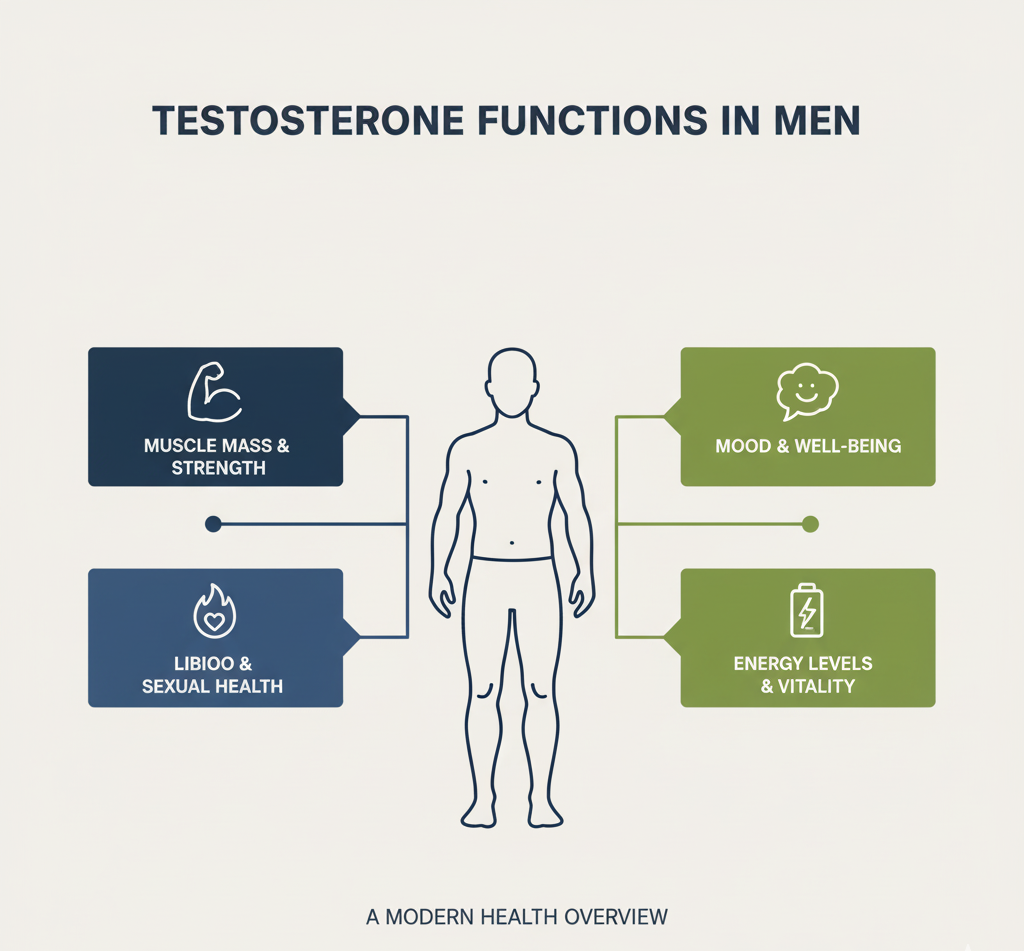
Overview of Testosterone and Its Role in Your 30s
Testosterone is the primary male hormone that regulates:
-
Muscle mass and strength
-
Libido and sexual performance
-
Energy levels
-
Body fat distribution
-
Hair growth
-
Mood and confidence
-
Bone density
-
Red blood cell production
While testosterone peaks in your early-to-mid 20s, it starts to decline slowly from the age of 30—usually by 1% every year. However, modern lifestyle factors may speed this up, making some men experience noticeable symptoms earlier than expected.
For men focused on fitness, testosterone is especially important because it influences muscle recovery, fat loss, strength, and motivation.
Causes of Testosterone Decline in Your 30s
Natural Aging
A gradual decrease is normal. But in some men, the drop is more significant due to genetics, lifestyle, or medical conditions.
Stress (Cortisol Overload)
High stress levels reduce testosterone production. Indian men dealing with work pressure, late-night shifts, business tension, and financial stress experience accelerated decline.
Poor Sleep
Sleeping less than 6 hours per night disrupts hormone production. Testosterone is mainly produced during deep sleep.
Lack of Exercise
Sedentary behavior weakens the hormone-regulating system. Weight training encourages testosterone release; inactivity suppresses it.
Excess Body Fat
Obesity increases estrogen levels in men, which reduces testosterone. Belly fat especially contributes to hormonal imbalance.
Nutrient Deficiencies
Low levels of Vitamin D, Zinc, Magnesium, and Omega-3 are common in Indian diets and directly impact testosterone production.
Alcohol and Smoking
Both reduce hormone production and damage the testicular cells responsible for testosterone.
Medical Conditions
-
Hypothyroidism
-
Diabetes
-
High cholesterol
-
Testicular injury
-
Varicocele
-
Hormonal disorders
Medications
Certain drugs lower testosterone, such as steroids, antidepressants, and hair-loss tablets (finasteride).
Environmental Toxins
Plastic containers, chemical exposure, and pollution can affect hormone levels by disrupting the endocrine system.
Symptoms of Testosterone Decline in Your 30s
Testosterone affects almost every part of male health, so symptoms may appear in different areas of life.
Physical Symptoms
-
Reduced muscle mass
-
Difficulty losing fat
-
Fatigue or low stamina
-
Hair thinning
-
Weak bones
-
Reduced endurance
-
Gynecomastia (chest fat)
Sexual Symptoms
-
Low libido
-
Fewer morning erections
-
Erectile difficulty
-
Reduced semen volume
Mental and Emotional Symptoms
-
Irritability
-
Low confidence
-
Depressed mood
-
Difficulty concentrating
-
Reduced motivation
Fitness-Related Symptoms
-
Slow recovery after workouts
-
Reduced strength
-
Plateaus in muscle gain
-
Low workout motivation
If you are experiencing two or more symptoms, testing is recommended.
How Testosterone Is Diagnosed
Testing testosterone is simple and usually involves a morning blood test (7–10 AM).
Tests Commonly Done
-
Total Testosterone
-
Free Testosterone
-
SHBG (Sex Hormone Binding Globulin)
-
LH and FSH
-
Thyroid profile
-
Vitamin D
-
Prolactin
A doctor—usually an endocrinologist or urologist—interprets the results based on age, symptoms, and overall health.
Indian men often show “normal” lab results but still have symptoms due to low free testosterone or hormone imbalance, which is why a complete evaluation is important.
Treatment Options for Testosterone Decline
Lifestyle Correction (Most Effective for 30s)
Most men in their 30s can fix testosterone levels naturally through consistent lifestyle changes.
Medications or Hormonal Therapy
Only recommended when medically necessary:
-
Testosterone Replacement Therapy (TRT)
-
Clomiphene citrate
-
hCG injections
Important: These must only be used under a doctor’s supervision, especially in India where self-medication is common and risky.
Nutritional Supplements
Not a replacement for treatment, but may support hormone balance:
-
Zinc
-
Vitamin D3
-
Omega-3
-
Ashwagandha
-
Magnesium
-
Fenugreek extract
Always consult a doctor before use.
Natural Ways to Boost Testosterone in Your 30s
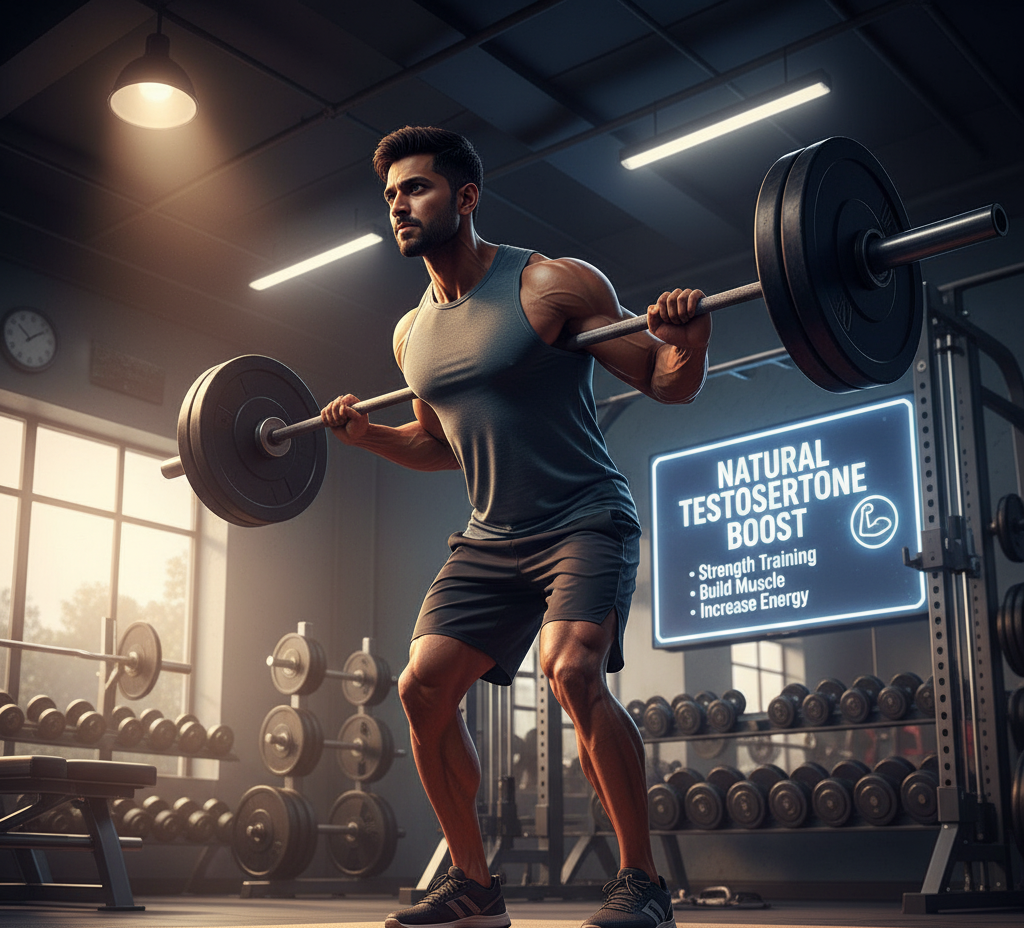
Strength Training
The best exercise for testosterone. Focus on compound lifts:
-
Squats
-
Deadlifts
-
Bench press
-
Pull-ups
HIIT Workouts
High-intensity exercises improve fitness and stimulate hormones better than long cardio.
Prioritize Sleep
Aim for 7–9 hours. Maintain regular sleep cycles.
Reduce Belly Fat
Losing fat automatically increases testosterone and improves men’s fitness.
Cut Sugar and Junk Food
These cause insulin spikes that reduce hormone production.
Increase Healthy Fats
Include:
-
Ghee
-
Coconut
-
Nuts
-
Avocado
-
Eggs
Avoid Plastics
Use glass or steel containers. BPA in plastic reduces testosterone.
Stress Management
Meditation, yoga, and outdoor activity regulate cortisol and improve hormone balance.
Prevention Tips for Healthy Testosterone in Your 30s
-
Avoid late-night work culture
-
Limit alcohol
-
Stop smoking
-
Get regular blood tests
-
Maintain an active lifestyle
-
Eat nutrient-rich Indian foods
-
Stay hydrated
-
Take sunlight daily for Vitamin D
Risks and Complications of Untreated Low Testosterone
If ignored, low testosterone can lead to:
-
Infertility
-
Severe mood disorders
-
Erectile dysfunction
-
Bone weakness
-
Increased heart disease risk
-
Muscle loss
-
Fat accumulation
-
Metabolic disorders
Early detection and lifestyle changes can prevent these complications.
When to See a Doctor
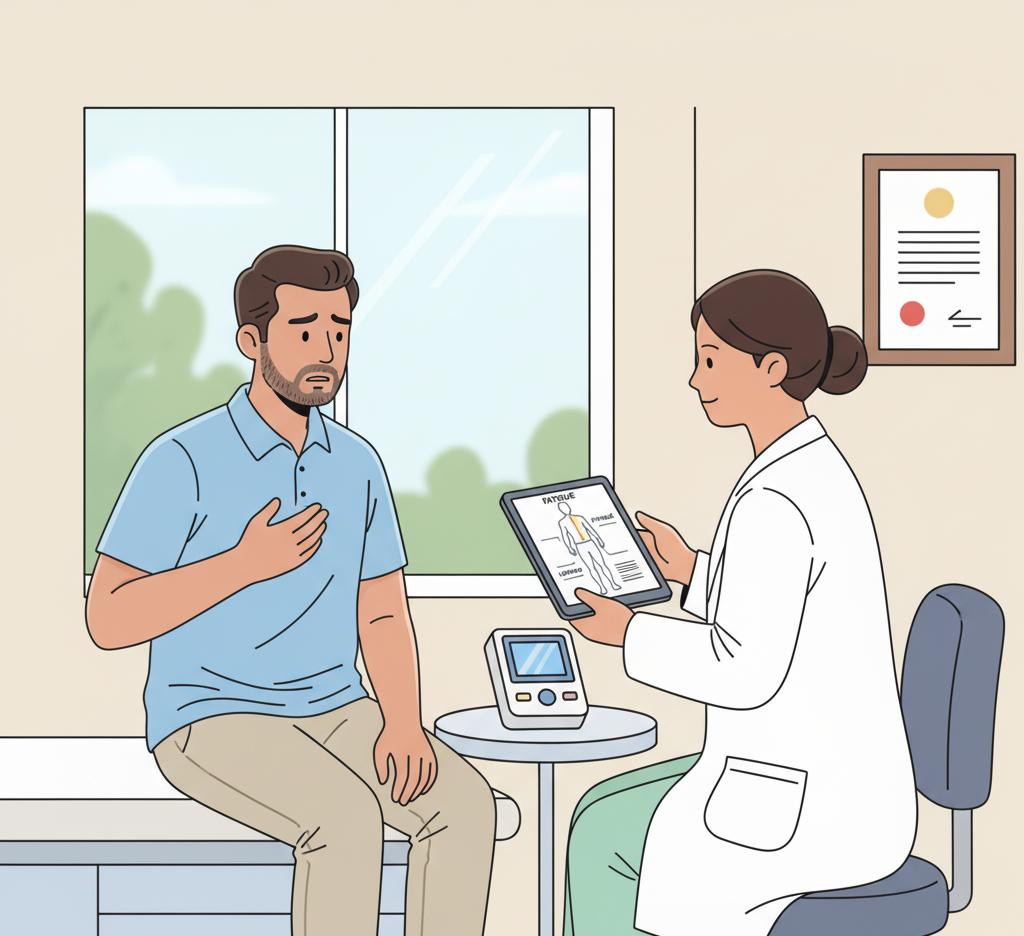
Visit a doctor if you notice:
-
Persistent fatigue
-
Low libido
-
Erectile issues
-
Unexplained weight gain
-
Low workout performance
-
Lack of motivation
-
Hair loss
-
Gynecomastia
Seek help early to protect long-term male health.
50 FAQs on Testosterone Decline in Your 30s
-
Can testosterone drop in your early 30s?
Yes, many men experience early decline due to stress, poor sleep, and lifestyle factors. -
Is testosterone decline normal?
A slow decline is normal, but rapid decline needs evaluation. -
Does low testosterone affect men’s fitness?
Yes, it reduces strength, muscle growth, and endurance. -
Can stress reduce testosterone?
Yes, high cortisol suppresses testosterone production. -
Are low libido and testosterone connected?
Strongly. Low T is a common cause of low sex drive. -
Can belly fat reduce testosterone?
Yes. Belly fat converts testosterone into estrogen. -
Does alcohol reduce testosterone?
Regular drinking significantly lowers hormone levels. -
Does poor sleep affect testosterone?
Yes. Most testosterone is produced during deep sleep. -
Can exercise boost testosterone?
Yes, especially strength training. -
Do protein supplements affect testosterone?
No, they are generally safe when used correctly. -
Does TRT build muscle?
Yes, but it is only for medically diagnosed deficiency. -
Is TRT safe in the long term?
Only under medical supervision. -
Can hair-loss medicines lower testosterone?
Finasteride may reduce DHT, affecting sexual function. -
Does weight loss increase testosterone?
Yes, losing fat helps restore hormonal balance. -
Can Vitamin D increase testosterone?
Yes, deficiency is linked to low T. -
Does masturbation affect testosterone?
No major effect. -
Can smoking lower testosterone?
Yes, smoking damages testicular cells. -
Can diabetes cause low testosterone?
Yes, diabetes is a major risk factor. -
Is low testosterone reversible?
Often yes, especially in early stages. -
How often should men test testosterone?
Once a year or if symptoms appear. -
Does testosterone decline affect mood?
Yes, low T can cause irritability or sadness. -
Can energy drinks reduce testosterone?
Excess caffeine and sugar can affect hormone balance. -
Can yoga improve testosterone?
Yes, through stress reduction. -
Does sex frequency affect testosterone?
Healthy sexual activity supports hormone balance. -
Can supplements replace medication?
No, they are only supportive. -
Is low testosterone genetic?
Genetics play a role in some cases. -
Does thyroid affect testosterone?
Yes, thyroid imbalance can reduce testosterone. -
Can skipping breakfast lower testosterone?
Not directly, but poor nutrition affects hormones. -
Does sunlight boost testosterone?
Yes, through Vitamin D production. -
Can depression reduce testosterone?
Yes, mental health affects hormones. -
Do steroids help testosterone?
No, they shut down natural hormone production. -
Can dehydration affect testosterone?
Mildly, but severe dehydration impacts overall health. -
Can low testosterone cause infertility?
Yes, it reduces sperm production. -
Can liver problems reduce testosterone?
Yes, the liver helps metabolize hormones. -
Is herbal testosterone safe?
Only if prescribed by a professional. -
Does cycling affect testosterone?
Long-distance cycling may reduce hormone levels. -
Does fasting affect testosterone?
Short fasting is ok; long fasting may reduce levels. -
Can prostate issues affect testosterone?
Some conditions affect hormonal regulation. -
Can low testosterone cause weight gain?
Yes, especially belly fat. -
Does testosterone decline affect beard growth?
Possibly, if levels drop significantly. -
Can testosterone affect bones?
Yes, low T weakens bone density. -
Can men in their 30s take TRT?
Only if medically indicated. -
Does high-protein diet affect testosterone?
No negative impact when balanced. -
Does a sedentary job reduce testosterone?
Yes, sitting for long hours affects hormones. -
Is strength training safe with low testosterone?
Yes, and it helps improve levels. -
Can heart disease cause low testosterone?
Yes, and vice versa. -
Does chronic illness reduce testosterone?
Yes, long-term illness can affect hormones. -
Can testosterone affect metabolism?
Yes, it regulates fat burning. -
Can poor gut health affect testosterone?
Indirectly, through inflammation and nutrient absorption. -
How long does it take to improve testosterone?
4–12 weeks with lifestyle changes, longer for medical treatment.
Conclusion
Testosterone decline in your 30s is more common than most Indian men realize. The effects are not just sexual—they impact fitness, mood, confidence, and long-term male health. With timely testing, simple lifestyle changes, stress control, proper sleep, strength training, and medical assistance when needed, most men can restore their energy, performance, and overall well-being.
Taking charge early makes a big difference.
Quickobook CTA
If you’re experiencing symptoms of low testosterone or need a comprehensive health evaluation:
Book an appointment with a specialist on Quickobook today.
Find top endocrinologists, urologists, and general physicians near you.
Get lab tests, consultations, and follow-ups—all in one place.
Disclaimer
This blog is for educational purposes only and does not replace a doctor’s consultation. Do not self-diagnose or start medicines without professional advice. Dosage, treatment, and diagnostic decisions must always be made by a qualified healthcare provider.


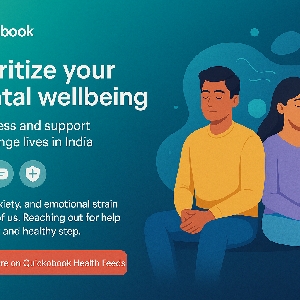
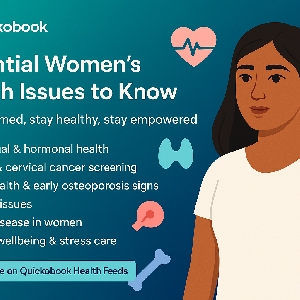
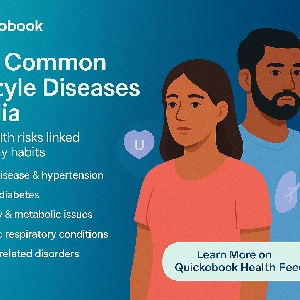




Comments (0)
No comments yet. Be the first to share your thoughts!
Leave a Comment